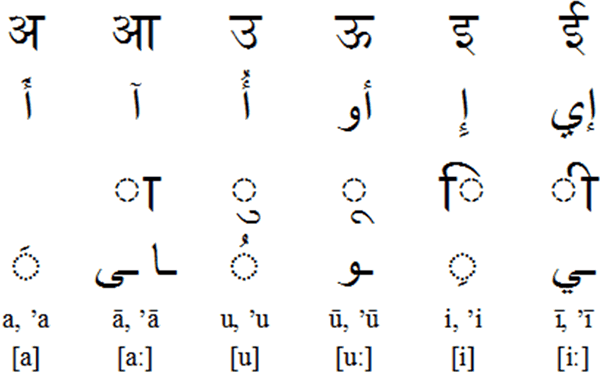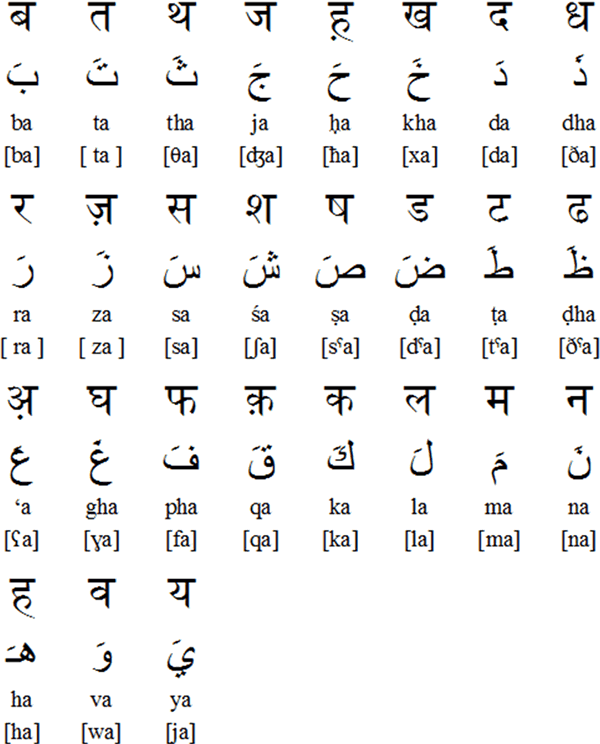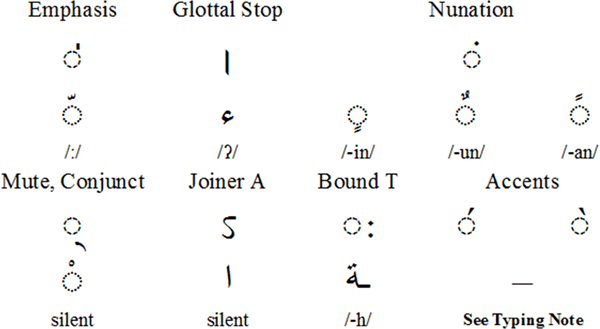Arabindi (अल्अ़रबिन्दियः॑ / الْعَرَبِنْدِيَّة)
Arabindi is a method of writing Arabic using the
Devanagari script devised by Zein Al Abideen Shabeeb
(of Syrian and Egyptian descent). Devanagari can be used
to write Arabic as a number of other languages can be written
with both scripts: Sindhi, Kashmiri, Saraiki, Rajasthani
and Konkani. The word Arabindi comes from Arabic + Hindi.
Arabindi uses 6 vowels and 27 consonants. Some consonants
use the sign ़ (nukta) to change its pronunciation
like क /k/ => क़ /q/. This may enable
to adaptation of Devanagari to write other languages spoken outside the
Indian subcontinent that use the Arabic script, and make
it possible to adapt other scripts to write Arabic.
Arabindi alphabet
Vowels

Consonants

Diacritics

Numerals

Typing Notes
- The letter अ़ (عَ) cannot be conjuncted with the vowel ा (ـا) to equalize عا in Arabic, so it can be replaced with the letter आ with the sign ़ (Nukta) to make आ़.
- The signs ं (Anusvāra) and ः (Visarga) are inserted after vowel signs.
- The sign ् (Virāma) conjuncts consonants and mutes previous letters.
- The sign ़ (Nukta) is inserted before vowels, but the sign ॑ (Udatta) is inserted after other signs.
- The sign ऽ (Avagraha) symbolizes Joiner A (ا) which is silent. If there is just one word or it is at the start of a sentence, it is replaced with a vowel letter. e.g.
الْمَكانُ نَظيفٌ अल्मकानु नढीफुं (start of a sentence) لِنَجْعَل الْمَكانَ نَظيفاً लिनज्अ़लि ऽल्मकान नढीफं (elsewhere)
- The sign । (Danda) symbolizes a Muted Glottal Stop (ءْ). If there is a vowel after a Glottal Stop, this sign is replaced with a vowel letter. e.g.
مُؤْتَمِنْ मु।तमिन्, مُؤَيَّدْ मुअय॑द्
رِئْبالْ रि।बाल्, رَئيفْ रईफ्
يَأْخُذ य।खुध्, مَسْؤولْ मस्ऊल्
- The accents Acute ॔ and Grave ॓ are used only with Name of God अल्लाः (الله) to change the sound between soft /æ/ and hard /ɑ/, e.g.
بِاللهِ बिल्ला॔हि /bilːæːhi/
اللهُअल्ला॓हु /aɫːɑːhu/
Structure notes
- In the definite article अल् (الـ), ल is deleted, and the next letter is emphasised if it is one of the following: त, थ, द, ध, र, ज़, स, श, ष, ड, ट, ढ, ल and न. These letters are named Solar L letters and rest of the letters are Lunar L letters.
e.g. النّاطِق अल् + नाटिक़् = अना॑टिक़् (Solar L)
الْمُراقِب अल् + मुराक़िब् = अल्मुराक़िब् (Lunar L)
- When a long-vowel final part of speech is succeeded by a short-vowel in word-initial position, long vowels => short vowels and initial vowel letter => ऽ.
e.g. في انْتِظار फी + इन्तिढार् = फि ऽन्तिढार्
عَلى الْأَرْض अ़ला + अल्अर्ड् = अ़ल ऽल्अर्ड्
هذا الرَّجُل हाधा + अर॑जुल् = हाध ऽर॑जुल्
أَيُّها الْمُؤْمِنون अयु॑हा + अल्मु।मिनून् = अयु॑ह ऽल्मु।मिनून्
لا الْمَكانْ ला + अल्मकान् = ल ऽल्मकान्
- When अल् is succeeded by इ in word-initial position, ल् => लि, and इ are deleted: e.g. الاِسْتِخْدام अल् + इस्तिख्दाम् = अलिस्तिख्दाम्
- When अल् is preceeded by single parts of speech, अ is deleted: e.g. بِالْقُوَّة बि + अल्क़ुवः॑ = बिल्क़ुवः॑
- When a bound T (ة) is not muted, ः (visarga) => त. e.g. مَرَّةً أُخْرى मरः॑ + उख्रा = मर॑तं उख्रा أَمْتِعَةُ الرِّحْلَة अम्तिअ़ः + अरि॑ह़्लः = अम्तिअ़तु ऽरि॑ह़्लः
- If a nunation diacritic is succeeded by a vowel in word-initial position, ं (anusvara) => नि e.g. راجِياً الرَّحْمَة राजियं + अर॑ह़्मः = राजियनि ऽर॑ह़्मः
- In numbers, given names and two-syllable words, initial vowels aren’t deleted even when they are preceeded by अल्, ं (anusvara) or parts of speech.
e.g. الْأَرْبَعون अल् + अर्बअ़ून् = अल्अर्बअ़ून् (Number)
وَأَحْمَدُ व + अह़्मदु = वअह़्मदु (Given Name)
طالِباً إِمْساكَ टालिबं + इम्साक = टालिबं इम्साक (two-syllable word)
Sample text

Standard Arabic version

Translation
All human beings are born free and equal in dignity and rights. They
are endowed with reason and conscience and should act towards one another
in a spirit of brotherhood.
(Article 1 of the Universal Declaration of Human Rights)
How to contact Zein Al Abideen Shabeeb
Email: z.shabeeb@live.com
Facebook: https://www.facebook.com/Propaganda.Charisma
Twitter: https://twitter.com/zeinalabideen
Constructed scripts for: Ainu |
Arabic |
Chinese languages |
Dutch |
English |
Hawaiian |
Hungarian |
Japanese |
Korean |
Lingala |
Malay & Indonesian |
Persian |
Tagalog / Filipino |
Russian |
Sanskrit |
Spanish |
Taino |
Turkish |
Vietnamese |
Welsh |
Other natural languages |
Colour-based scripts |
Tactile scripts |
Phonetic/universal scripts |
Constructed scripts for constructed languages |
Adaptations of existing alphabets |
Fictional alphabets |
Magical alphabets |
A-Z index |
How to submit a constructed script
[top]

You can support this site by Buying Me A Coffee, and if you like what you see on this page, you can use the buttons below to share it with people you know.

If you like this site and find it useful, you can support it by making a donation via PayPal or Patreon, or by contributing in other ways. Omniglot is how I make my living.
Note: all links on this site to Amazon.com , Amazon.co.uk
, Amazon.co.uk and Amazon.fr
and Amazon.fr are affiliate links. This means I earn a commission if you click on any of them and buy something. So by clicking on these links you can help to support this site.
are affiliate links. This means I earn a commission if you click on any of them and buy something. So by clicking on these links you can help to support this site.
[top]







, Amazon.co.uk
and Amazon.fr
are affiliate links. This means I earn a commission if you click on any of them and buy something. So by clicking on these links you can help to support this site.